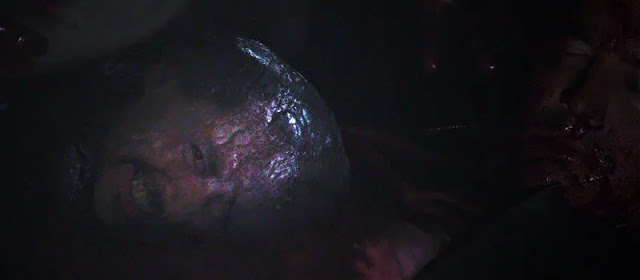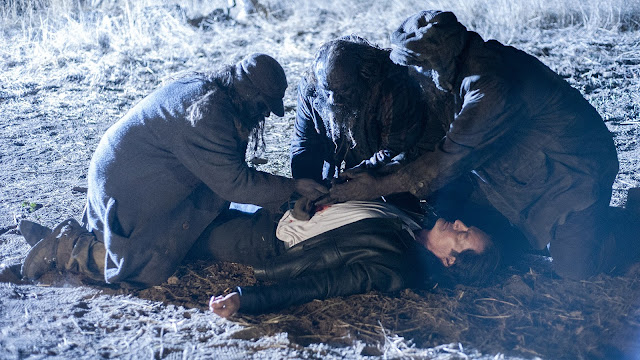TWIN PEAKS SEASON 3 (2017) OVERVIEW
On May 21st 2017 fans of 90's TV show Twin Peaks finally got to see the resolution of the cliffhanger that had been plaguing them for the past 25 years when Twin Peaks season 3 arrived on streaming service Showtime.
To say anticipation was high would be an understatement, for months prior to the premiere the Internet was going ballistic with fan theories and speculation, casting rumours, set photos and all kinds of potentially spoilerific gossip. Once more Twin Peaks was going to be "event television" in a way it probably hadn't been ever since Laura Palmer's killer was revealed in the early part of season 2 all those many years ago.
However, as you could probably guess, when the show finally aired it was totally unlike ANYTHING that had gone out on TV before or since...it was even unlike it's previous self.
The differences between this new bold era of Twin Peaks and the classic series are many and varied but I'll go with the obvious stuff first of all. Firstly - all the returning faces from the original series look so much older. After 25 years this is to be expected of course, the ageing process is just a fact of life, but it's still really jarring to see characters that we remember as being young now being in mid-to-late middle age. Lynch knows this of course and turns the fact of the ageing actors to his advantage. Everything growing older becomes one of the main themes of the story from the characters themselves to the actual town of Twin Peaks itself (which seems a lot less idyllic and old fashioned now - its become a bit more modern but also parts seem a bit broken down and ramshackle. Like the 21st century has invaded the picturesque little town and beaten it into submission).
Lynch himself has gone on record as saying that this series addresses the issue that "you can never go back", no matter how much you may want to. This older, grimier Twin Peaks has a slightly bittersweet tang to it - it's good to be back among old friends but also a little melancholy at the same time. Like turning up to a school reunion and seeing your childhood friends as stressed out adults with mortgages - something has been lost, you never can go back...its true.
Further adding to this weight of time passing are those characters and actors that for one reason or another are no longer present. In some cases this is due to behind the scenes ructions and the actors in question not being asked to return, in others (as with Michael Ontkean who played Sherrif Harry Truman) its because the actors have since retired. Sadly in most cases though its mainly because the actors themselves have passed away. 25 years is a long time afterall and time can be a cruel mistress as we all know.
Lynch does find ways to incorporate these lost actors' characters into the storyline in meaningful ways though - both Don Davies' Major Garland Briggs and Frank Silva's BOB are still major players in the story despite both actors being dead for 20 or more years. In Silva's case this is achieved by CGI trickery - BOB is now a howling meteorite-like ball with Silva's distinctive face glowering from it. It's nice to see that despite natures best efforts the lost people who helped make the original show to be so memorable where able to be included in some way.
Several actors also make thier swansongs in this series. Catherine Coulson who played the Log Lady in the original series was diagnosed with terminal cancer before the series went into production. Undaunted by this Coulson was determined to appear in the show and she held on just long enough to film a few scenes where the Log Lady is talking to Deputy Hawk over the phone. It's heartbreaking to see her in such a frail state but Coulson shows so much dignity and strength by even being there that you still can't help but feel reassured by her presence - Twin Peaks wouldn't be Twin Peaks without the Log Lady. Coulson died a few days after filming her scenes. In the show The Log Lady dies and Hawk announces her death to a tearful Lucy and Andy and you just know those tears are for real. Rest in Peace.
Twin Peaks season 3 also features the last performance of Miguel Ferrer as Albert Rosenfeld. Ferrer was also ill with cancer but kept his diagnosis hidden from his fellow cast until after filming wrapped. Ferrer lived to complete the series but sadly didn't live to see it air. As always Ferrer is brilliant as Albert - just as sardonic, sarcastic and world weary as ever. He gets some moments of sheer comedy brilliance in this third season as well as a lot more darker moments than he ever had in the original show. His bickering with Gordon Cole (David Lynch) is sheer gold - the two men have obviously been working together for so long that they've almost become like an old married couple. They snipe at each other but also have a deep friendship and trust for one another. Its great to watch and Ferrer is another actor who will be sadly missed.
There's also Freddy Sykes (Jake Wardle) - a Londoner living in Twin Peaks who wears a single green gardening glove which gives him Hulk-like super strength in one hand. He's a deliberately ridiculous character (it's basically Lynch taking the piss out of the current fad for Marvel superheroes) but he does prove to be instrumental in defeating BOB once and for all.
Another thing that becomes apparent upon watching season 3 is that the story covers a much wider area. The original show was set almost entirely within the town of Twin Peaks itself (only briefly breaking away for the scenes where James Hurley is on his road trip). The new show has storylines taking place as far afield as Las Vegas, New York, South Dakota, New Mexico and Texas. All these disparate stories end up converging and coming to a head in the small town though.
The series is constructed more like a novel than an episodic TV show, entire characters and settings disappear off screen for several episodes until its thier time to appear again. This can make the series feel a bit disjointed in places but its well worth sticking with as everything is paid off nicely.
Music is also used differently in the new series. In the original the incidental music of Angelo Badalamenti and Julee Cruise became almost a character in itself - it seemed to be playing almost continuously as an aural backdrop. In season 3 however the music is much more sparse. Entire scenes play out with no incidental music at all. This at first seems very jarring but you soon get used to it. As the show progresses we do get more snatches of music (we even get brief musical "cameos" from the original 90's score) and the show soon establishes a new audio identity of its own.
Perhaps the most noteable use of music is within the Roadhouse itself. As with much of the town of Twin Peaks the Roadhouse (aka The Bang Bang Bar) has changed since the 90's. Its gotten a lot busier and rowdier than it used to be and also seems a lot trendier than it was of old. The place seems to be packed to the rafters with swaying gigging hipsters in thier 20's to early 30's, spending thier wages and evenings on partying and watching hot bands play. At the end of most episodes we get various bands play us out over the end credits almost like Twin Peaks has become some kind of late night music performance show.
So what does the actual plot of season 3 entail ? Well basically it's all about wrapping up the infamous cliffhanger that the original series ended on. It turns out that it actually WASN'T the real Dale Cooper that was possessed by BOB at the end of season 2, rather it was his evil Doppelganger that was birthed in the confines of the Black Lodge. The Doppelganger had escaped and BOB had also piggybacked his way out leaving the combined evil Cooper/BOB entity free to run amok in the outside world. The real Cooper is trapped inside the Black Lodge where he's been for the past 25 years...
In the opening episodes of the season we see Cooper finally make his escape from the Lodge encountering many strange entities on the way. Cooper travels through the Black Lodge and finds his way into the White Lodge (a realm of goodness which for the some reason looks like an old black and white 1930's movie theatre inside) from there Cooper discovers a hatch which lets him escape back into our world.
Little does Cooper know that evil Cooper aka Mr. C has left a trap for him in the shape of a manufactured clone called Dougie Jones. Cooper swaps places with Dougie (who is taken into the Lodge and consumed) and essentially "becomes" Dougie. The only problem is that Cooper's mind had become somewhat frazzled by travelling between worlds and he's now in a catatonic state. This leads him into danger as Mr C. has hired several people to take Cooper/Dougie down including a psychotic dwarf hitman called Ike the Spike (Christophe Zajacc-Denek) and a hitman and hitwoman pair of hillbilly assasains Hutch (Tim Roth) and Chantal (Jennifer Jason Leigh) who appear to have literally stepped straight out of a Tarantino movie.
Meanwhile Cooper's old colleagues Gordon Cole (David Lynch) and Albert Rosenfeld (Miguel Ferrer) team up with sexy female FBI agent Tammy Preston (Chrysta Bell) to investigate a mysterious headless corpse which turns out to be that of Garland Briggs (his head has detached itself and he's become a denizen of the White Lodge). This leads them to seek out Cooper once more and have a run-in with Mr C. They also recruit Cooper's old secretary Diane (Laura Dern) - who was only ever mentioned but never seen in the original - to help them.
Meanwhile in Twin Peaks the Sherrif's department are following clues left by the dying Log Lady to try to find an entrance to the White Lodge as reality starts to seemingly fracture around them - the clues to this entrance, of course, lie in the missing pages of Laura Palmer's long lost diary...
Along the way we get a mid-season flashback to the 1940's/50's where we see BOB unleashed upon the world via the very first atom bomb test and a strange "Frog-Moth" creature infest a young girl who is heavily implied to be Laura's mother - Sarah - when she was a teenager. In the present day we see that Sarah Palmer (Grace Zabriski) is indeed possessed by some kind of evil entity.
The whole plot is balls-to-wall INSANITY and is absolutely great. It all ends with a fully restored Cooper travelling back in time to the events of Fire Walk With Me and preventing Laura Palmer from being killed thus changing history. The forces of evil capture the newly rescued Laura and dump her in a different parallel reality where she loses her memory, adopts a new name - Carrie Paige - and grows old (well...middle aged at any rate). In the final episode Cooper travels to this parallel Earth and takes Carrie/Laura to that reality's version of Twin Peaks in an attempt to jog her memories. It doesn't go well. Cooper and Carrie/Laura realise they are trapped. Laura's memory seems like its about to return and she screams in horror... Fade to black. This time it seems Twin Peaks is truly over and once more the bad guys appear to have won.
It sounds like it should be frustrating (and to some people it was) but this open ended finale feels a lot more satisfying than the original cliffhanger ending did. It feels more earned (and more tragic) somehow than what we got before.
Season 3 really belongs to Kyle MacLachlan. It's a great performance and the main thrust of the story is really a deconstruction of Dale Cooper's character. We see his evil self Mr C and he's every bit as twisted as you'd expect him to be. Not only is he powered by the depraved demon BOB but also by the inversions of Cooper's own instincts. We saw what a virtuous man Cooper was in the original serial, now we see the flipside of that. Mr C is a cold, dead eyed killer. He's also a sexual predator. He reminds me a little of Stephen King's Randall Flagg character - a man who walks through history causing chaos and grief in his wake. He's a great villain and makes up for the sad loss of the late Frank Silva's BOB whilst still playing tribute to that actor's performance.
On the other side of the scale we get MacLachlan as the real Cooper who thinks he's Dougie Jones. Dougie Coop is a complete innocent. An awkward but endearing man-child who blunders into and out of various life threatening situations and survives by a combination of supernatural guidance, Cooper's own innate lingering abilities combined with a healthy dash of sheer luck and coincidence. Dougie is an idiot savant whose vulnerability and inner goodness seems to bring out the best in everybody that he meets including a pair of Las Vegas gangsters - The Mitchum Brothers (Jim Belushi and Robert Knepper) and Dougie's own tough and embittered wife Janey-E (Naomi Watts). A lot of people complained that the Dougie storyline took up too much screen time and just wanted to see MacLachlan play the "real" Dale Cooper but his performance as Dougie is just so likeable that you can't help but get on board with it (it's also VERY funny in places).
When Cooper is finally restored to himself ("I AM the FBI") it's a true punch the air moment and is well worth the wait. He's every bit the hero he was before - the perfect lawman and the perfect gentleman. He goes to Twin Peaks, sees some old friends, defeats his evil self (with more than a little help from Lucy), defeats BOB (with more than a little help from Freddy Sykes) and then - for an encore - goes back in time and saves Laura Palmer ! This of course goes horribly wrong...
Y'see, even with the best of intentions (and his evil side removed and killed) Cooper is STILL a flawed hero. He's just a man and in those closing episodes he sets himself up above the Gods. He changes history (possibly beyond recognition), sure all the bad stuff that's happened in the past 25 years is wiped clean but also so is all the GOOD stuff. From the outset of Twin Peaks we've seen that for every horrible death or dark deed there's also moments of beauty and light. Now they've gone too - AND IT'S ALL COOPER'S FAULT. By saving Laura he bites off more than he can chew and totally overreaches himself. It's a bleak but strangely satisfying ending to what has become an epic tale of good vs evil. In the end even the purest of people can fall to the dangers of thier own hubris. Its refreshing to be reminded of that from time to time.
Twin Peaks season 3 is an epic decades spanning story that is far more ambitious in scope than the original was (as groundbreaking as it was in it's day). In places it doesn't quite satisfy (I felt Audrey Horne's storyline was a little underwhelming). In others it gives you a lot more than you ever realised you needed (the brilliantly creepy "Woodsmen" - some of the most sinister villians to appear on TV in a long time). Twin Peaks season 3 is exciting, epic, deeply strange, profoundly moving in places, horrific in others. It's wild, sometimes whacky, sometimes melancholy and always ALWAYS massively entertaining. It's not just the continuation of a TV legend, it's also the approximation of literally EVERYTHING David Lynch has done throughout his entire career. It's a celebration, a reunion and a eulogy all in one. Go and watch it again - you deserve it.



































Comments
Post a Comment